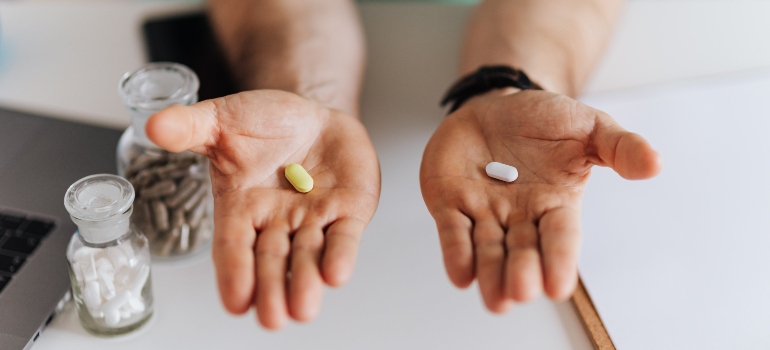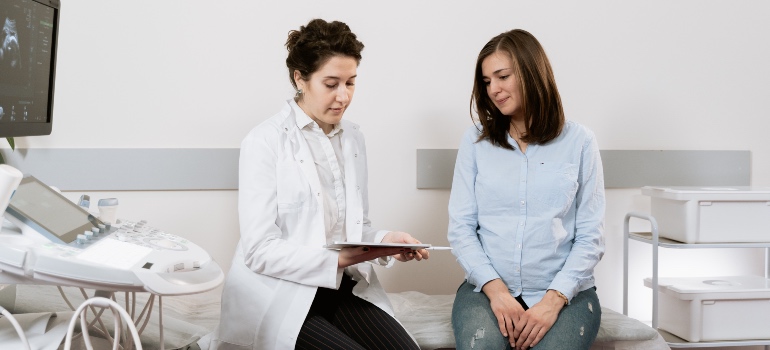Pregnancy is a time of profound joy and anticipation for expectant mothers. However, it can also be filled with worries and questions, especially when facing the challenges of opioid addiction. If you’re an expectant mother grappling with opioid dependence, you’re not alone in your journey. Harmony Ridge Recovery Center WV will explore the complex and sensitive topic of methadone and pregnancy to explain both the potential risks and benefits. We understand that you may be feeling overwhelmed and anxious, and our aim is to provide you with the information you need to make the best choice for your health.
What are the risks of untreated opioid addiction during pregnancy?
Untreated opioid addiction during pregnancy can have significant risks for both the expectant mother and the developing baby. When a pregnant woman continues to use opioids like heroin or prescription pain medications without seeking the substance abuse treatment WV offers, several concerning issues can arise.

First and foremost, the risk of overdose remains high. The purity and potency of street drugs can vary greatly. This makes it difficult to know how much of the opioid is being consumed. An overdose can be life-threatening for the mother and, tragically, for the unborn child as well.
Opioid withdrawal symptoms, if untreated, can also be distressing for both the mother and the baby. These symptoms include intense cravings, anxiety, nausea, vomiting, diarrhea, and muscle pain. The stress and discomfort associated with withdrawal can lead to complications during pregnancy and increase the risk of preterm birth.
Furthermore, untreated opioid addiction often leads to a lack of prenatal care. Expectant mothers struggling with addiction may be less likely to seek regular medical check-ups and attend important prenatal appointments. This can result in missed opportunities to monitor the baby’s growth and development, detect potential issues, and receive necessary interventions.
The risk of infectious diseases, like hepatitis and HIV, also increases with untreated opioid addiction, as sharing needles or engaging in risky behaviors may be more common. These infections can be transmitted to the baby during pregnancy or childbirth.
What is methadone, and how does it help addiction recovery?
Methadone is a medication that’s commonly used to treat opioid addiction, particularly in the context of opioid maintenance therapy or medication assisted treatment West Virginia offers. It’s a long-acting synthetic opioid, which means it has similar effects to other opioids, but it works differently in some important ways. Here’s what it does:
- Opioid Replacement: Methadone acts as a substitute for other opioids. When taken as prescribed, it helps to reduce cravings and withdrawal symptoms that people with opioid addiction often experience. This allows individuals to stabilize their lives and reduce or eliminate the use of more harmful and illegal opioids.
- Blockade Effect: Methadone binds to the same opioid receptors in the brain that other opioids target, but it does so more slowly and with a milder effect. This “blocks” the receptors, making it harder for other opioids to attach and produce their euphoric or pain-relieving effects. This helps to reduce the rewarding effects of using opioids.
- Long-Lasting: Methadone has a long duration of action, which means it can provide relief from cravings and withdrawal symptoms for an extended period—typically 24 to 36 hours. This makes it suitable for daily or even less frequent dosing in a clinical setting.
- Stabilization: One of the primary goals of methadone treatment is to stabilize a person’s life and reduce the chaotic, unpredictable nature of opioid addiction.

It’s important to note that methadone is not a “cure” for opioid addiction but a tool to help individuals manage their addiction and work towards recovery. Its use should always be under the guidance of a qualified healthcare provider, such as those in drug rehab in West Virginia, as improper use can lead to its own set of risks and potential addiction.
How is methadone used in opioid dependency treatment?
The first step is to determine if methadone treatment is an appropriate choice. This is done by a healthcare provider. They will evaluate the individual’s history of opioid use, physical and mental health, and social circumstances.
If methadone is considered a suitable treatment option, the individual then undergoes an initial “induction” phase. During induction, they are started on a carefully calculated dose of methadone. This dose is usually lower than what would fully suppress opioid cravings and withdrawal symptoms.
After the initial induction phase, the healthcare provider adjusts the methadone dose as needed to reach a stable maintenance dose. Once a stable dose is achieved, the individual enters the maintenance phase. During this phase, they continue to take methadone as prescribed, typically on a daily basis, at a methadone clinic under supervision.
Alongside methadone treatment, individuals are encouraged to participate in counseling and support services. This could include individual therapy, family therapy for addiction, or other forms of support that help address the underlying causes of addiction and provide coping strategies to maintain abstinence.
Is methadone safe during pregnancy?
Methadone can be a safer option for pregnant women with opioid addiction compared to using illicit opioids. It helps prevent withdrawal symptoms and reduces the risks associated with opioid use during pregnancy. However, it should be used under careful medical supervision. It’s not entirely risk-free, and you should weigh the potential benefits against the potential risks.

Benefits of methadone treatment for expecting mothers
The benefits of methadone treatment during pregnancy are closely tied to the specific challenges that pregnant women with opioid addiction face. These include:
- Reduced Withdrawal Symptoms: Methadone helps to alleviate the intense withdrawal symptoms associated with opioid addiction. This is crucial during pregnancy, as withdrawal can be distressing and potentially harmful to both the mother and the baby. This makes pregnancy less stressful.
- Improved Prenatal Care: Methadone treatment often encourages pregnant individuals to engage in regular prenatal care, including check-ups, ultrasounds, and other essential medical appointments.
- Lower Risk of Relapse: Methadone reduces the cravings for illicit opioids, making it less likely that expectant mothers will resort to using street drugs, which can be of uncertain purity and potency. This lowers the risk of overdose and decreases the potential for engaging in risky behaviors.
- Decreased Risk of Infectious Diseases: Methadone treatment in a clinical setting, such as in drug rehab for pregnant women, reduces the likelihood of sharing needles or engaging in other high-risk behaviors associated with opioid addiction. This can lower the risk of contracting infectious diseases.
- Enhanced Birth Outcomes: Research suggests that, when appropriately managed, methadone treatment can lead to better birth outcomes compared to unmanaged opioid addiction. It can reduce the risk of preterm birth, low birth weight, and other complications.
- Long-Term Recovery: Methadone can serve as a stepping stone toward long-term recovery. The stability it provides during pregnancy can continue into the postpartum period and beyond.
- Reduction in Legal and Social Issues: For pregnant individuals struggling with opioid addiction, methadone treatment can reduce the risk of legal and social consequences associated with drug use. This can help families stay together and avoid involvement with child protective services.
Methadone and pregnancy: the risks
Methadone use during pregnancy, while offering benefits, also carries potential risks that need to be carefully managed. Here are some of the potential risks and ways to mitigate them:
- Neonatal Abstinence Syndrome (NAS): Methadone can still lead to NAS in newborns, albeit usually milder than untreated opioid addiction. To mitigate this risk, healthcare providers can carefully monitor the baby after birth.
- Risk of Overdose: If the methadone dose is too high, it can lead to an overdose for the pregnant mother or adverse effects on the baby. To avoid this risk, dosing should be carefully tailored to the individual’s needs and monitored closely.
- Premature Birth: Methadone use may increase the risk of preterm birth. Pregnant individuals on methadone should receive comprehensive prenatal care to monitor and address this risk.
- Growth Restriction: There is a potential for the baby’s growth to be restricted while on methadone. Regular prenatal check-ups and ultrasounds can help identify growth issues early.
- Withdrawal in Newborns: While NAS can be milder with methadone, some newborns may still experience withdrawal symptoms.
- Dependency: Methadone itself can lead to physical dependency, and both the mother and the baby can experience withdrawal symptoms if the medication is abruptly discontinued. To avoid this, methadone doses should be gradually tapered after delivery.
- Maternal Health: Prolonged methadone use can affect the mother’s health, including potential risks to the liver and heart. Routine medical assessments are necessary to monitor the mother’s well-being.

Methadone and pregnancy vs. other treatment options
In addition to methadone, there are other options for the treatment of opioid addiction during pregnancy. The choice of treatment should be based on an individual’s specific needs and circumstances.
Buprenorphine is another medication used in medication-assisted treatment (MAT) for opioid addiction. It can be a suitable alternative to methadone during pregnancy. Buprenorphine has a lower risk of overdose and may result in milder withdrawal symptoms in newborns.
Naltrexone is another option. It is an opioid receptor antagonist used to prevent opioid use by blocking the effects of opioids. It’s available in an extended-release injectable form (Vivitrol) and as an oral medication. Naltrexone is generally used after detoxification, but it may be an option for some pregnant individuals after the first trimester.
Additionally, some expectant mothers may choose to undergo medically supervised opioid detoxification during the first trimester. However, this can be risky and is generally discouraged because withdrawal symptoms can be harmful to the fetus. Detoxification should only be considered under close medical supervision and after a thorough risk assessment.
Finally, individual behavioral therapies, such as cognitive-behavioral therapy (CBT) and contingency management, can be effective in treating opioid addiction and addressing its underlying causes. This type of individual therapy for addiction can be used alongside medication-assisted treatment or as a stand-alone option.
Overcoming the stigma surrounding methadone treatment during pregnancy
Overcoming the stigma associated with methadone and pregnancy can encourage expectant mothers with opioid addiction to seek the professional help and support they need. Solid knowledge can dispel misconceptions and biases. Engage in open and non-judgmental dialogues about addiction and its treatment. Creating an environment where you can talk openly about addiction and treatment without fear of judgment can help break down stigma.
Therefore, engaging with support groups can provide a sense of belonging and reduce feelings of isolation. Consider participating in group therapy for addiction, where you can connect with others who have experienced or are going through similar challenges.

Seek guidance from healthcare professionals specializing in addiction medicine and maternal-fetal medicine. They can offer you the most accurate and up-to-date information on methadone treatment during pregnancy.
Postpartum recovery
As you prepare for the postpartum phase of your recovery journey, it’s essential to recognize that the challenges you face won’t end with childbirth. Postpartum recovery, both physically and emotionally, is a crucial part of the process. Counseling and therapy can play a significant role in helping you navigate this period.
These services provide a safe and supportive environment to address the emotional and psychological aspects of your journey, offering coping strategies and tools to manage the unique stresses and emotions that can arise during this time.
Whether you’re dealing with postpartum depression, anxiety, or the ongoing challenges of addiction recovery, counseling and therapy can be invaluable resources to support your overall well-being and ensure a healthier, happier future for both you and your baby.
Methadone Treatment in Pregnancy Explained
The journey of expectant mothers facing opioid addiction, especially during methadone and pregnancy, is a challenging one. Still, it’s a journey that can be navigated with the right guidance and support. The decision to seek professional help, whether it’s through methadone treatment, counseling, or other resources, is a courageous step toward a healthier, happier future for both you and your baby. Remember that addiction does not define your worth or your capacity to be a loving and nurturing parent. With the right addiction therapy in West Virginia, care, resources, and support, you can build a strong foundation for your family’s well-being and recovery. There is hope, there is help, and there is a community of compassionate individuals ready to stand by your side.



